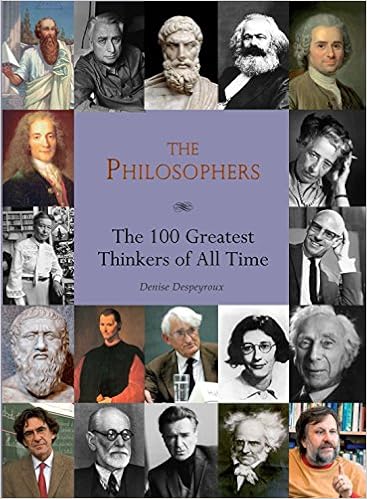A list of the greatest philosophers who have made original contributions to the field of philosophy.
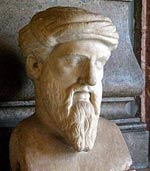 Pythagoras (c. 570 BC – c. 495 BC) Greek philosopher, spiritual leader and mathematician. Pythagoras is believed to be one of the first Western men to describe himself as a philosopher or ‘lover of wisdom’ His philosophy was based on the mystic traditions of Egypt and Greece and included a seeking for the soul.
Pythagoras (c. 570 BC – c. 495 BC) Greek philosopher, spiritual leader and mathematician. Pythagoras is believed to be one of the first Western men to describe himself as a philosopher or ‘lover of wisdom’ His philosophy was based on the mystic traditions of Egypt and Greece and included a seeking for the soul.


 Socrates (469 – 399 BC) Athenian philosopher, famous for the Socratic method of questioning every preconception. He sought to draw his followers into thinking about questions of life through a series of question. His philosophy was spread by his pupil Plato and recorded in Plato’s Republic.
Socrates (469 – 399 BC) Athenian philosopher, famous for the Socratic method of questioning every preconception. He sought to draw his followers into thinking about questions of life through a series of question. His philosophy was spread by his pupil Plato and recorded in Plato’s Republic.
 Plato (424 – 348 BC) – Greek philosopher. A student of Socrates, Plato founded the Academy in Athens – one of the earliest seats of learning. His writings, such as ‘The Republic’ form a basis of early Western philosophy. He also wrote on religion, politics and mathematics.
Plato (424 – 348 BC) – Greek philosopher. A student of Socrates, Plato founded the Academy in Athens – one of the earliest seats of learning. His writings, such as ‘The Republic’ form a basis of early Western philosophy. He also wrote on religion, politics and mathematics.
Aristotle



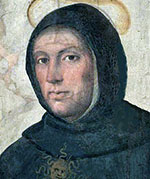 Thomas Aquinas (1225 – 1274) Italian friar and influential Roman Catholic priest, philosopher and theologian. Aquinas attempted to synthesize Aristotle’s philosophy with the principles of Christianity. Aquinas also developed a theory of natural theology – proving the existence of God through reason.
Thomas Aquinas (1225 – 1274) Italian friar and influential Roman Catholic priest, philosopher and theologian. Aquinas attempted to synthesize Aristotle’s philosophy with the principles of Christianity. Aquinas also developed a theory of natural theology – proving the existence of God through reason.

 Rene Descartes (1596 – 1650) French philosopher and mathematician. Dubbed the father of modern philosophy, Descartes was influential in a new rationalist movement. Descartes set a precedent for examining issues and trying to avoid any presumption. Descartes offered one of the most famous philosophic statements ‘Cogito ergo sum’ – “I think, therefore I am”
Rene Descartes (1596 – 1650) French philosopher and mathematician. Dubbed the father of modern philosophy, Descartes was influential in a new rationalist movement. Descartes set a precedent for examining issues and trying to avoid any presumption. Descartes offered one of the most famous philosophic statements ‘Cogito ergo sum’ – “I think, therefore I am”
 Baruch Spinoza (1632 – 1677) Spinoza was a Jewish-Dutch philosopher. He was an influential rationalist, who saw the underlying unity in the universe. He was critical of religious scriptures and promoted a view that the Divine was in all, and the Universe was ordered, despite its apparent contradictions. In his work ‘Ethics’ he opposed the mind-body dualism of Descartes. He has contributed to Ethics, Epistemology, Metaphysics.
Baruch Spinoza (1632 – 1677) Spinoza was a Jewish-Dutch philosopher. He was an influential rationalist, who saw the underlying unity in the universe. He was critical of religious scriptures and promoted a view that the Divine was in all, and the Universe was ordered, despite its apparent contradictions. In his work ‘Ethics’ he opposed the mind-body dualism of Descartes. He has contributed to Ethics, Epistemology, Metaphysics.
 John Locke (1632 – 1704) Locke was a leading philosopher and political theorist, who had a profound impact on liberal political thought. He is credited with ideas, such as the social contract – the idea government needs to be with the consent of the governed. Locke also argued for liberty, religious tolerance and rights to life and property.
John Locke (1632 – 1704) Locke was a leading philosopher and political theorist, who had a profound impact on liberal political thought. He is credited with ideas, such as the social contract – the idea government needs to be with the consent of the governed. Locke also argued for liberty, religious tolerance and rights to life and property.


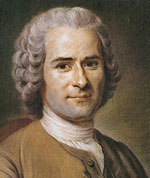 Jean Jacques Rousseau (1712 – 1778) Rousseau was a Swiss-born French philosopher. He expanded on Hobbes notion of a social contract to state it should be more egalitarian. He was critical of some aspects of formal religion but believed in the inherent divinity of man’s soul. Rousseau sought to prevent the corruption of this natural man, through better civil government and promotion of virtue.
Jean Jacques Rousseau (1712 – 1778) Rousseau was a Swiss-born French philosopher. He expanded on Hobbes notion of a social contract to state it should be more egalitarian. He was critical of some aspects of formal religion but believed in the inherent divinity of man’s soul. Rousseau sought to prevent the corruption of this natural man, through better civil government and promotion of virtue.
“Man is born free, but everywhere in chains” – Social Contract (1762)
 Immanuel Kant (1724 – 1804) Immanuel Kant was an influential German philosopher whose ‘Critique of Pure Reason’ (Kritik der reinen Vernunft, 1781) sought to unite reason with experience and move philosophy on from the debate between rationalists and empiricists. Kant’s philosophy was influential on future German idealists and philosophers, such as Shelling and Schopenhauer. A central concept of Kant’s philosophy was the ‘Categorical imperative’ – evaluating motivations for action.
Immanuel Kant (1724 – 1804) Immanuel Kant was an influential German philosopher whose ‘Critique of Pure Reason’ (Kritik der reinen Vernunft, 1781) sought to unite reason with experience and move philosophy on from the debate between rationalists and empiricists. Kant’s philosophy was influential on future German idealists and philosophers, such as Shelling and Schopenhauer. A central concept of Kant’s philosophy was the ‘Categorical imperative’ – evaluating motivations for action.
 Tom Paine (1737- 1809) English-American author, philosopher and social activist. Wrote ‘Common Sense‘ (1776) and the Rights of Man (1791). Important tracts supporting the principles of American and French revolutions.
Tom Paine (1737- 1809) English-American author, philosopher and social activist. Wrote ‘Common Sense‘ (1776) and the Rights of Man (1791). Important tracts supporting the principles of American and French revolutions.
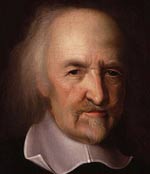

 Thomas Jefferson (1743- 1826) American statesman and philosopher. Third president of the US, and principal author of the Declaration of Independence, which stressed the innate rights of man.
Thomas Jefferson (1743- 1826) American statesman and philosopher. Third president of the US, and principal author of the Declaration of Independence, which stressed the innate rights of man.
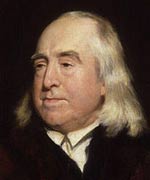 Jeremy Bentham (1748–1832) British philosopher. Bentham is credited with being the founding father of Utilitarianism. The philosophy that actions should be evaluated on the extent to which they increase happiness for the maximum number of people. He was also a leading social critic, advocating universal suffrage, animal rights, the abolition of slavery and penal reform.
Jeremy Bentham (1748–1832) British philosopher. Bentham is credited with being the founding father of Utilitarianism. The philosophy that actions should be evaluated on the extent to which they increase happiness for the maximum number of people. He was also a leading social critic, advocating universal suffrage, animal rights, the abolition of slavery and penal reform.

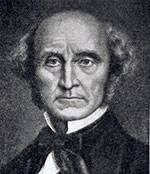 John Stuart Mill (1806 – 1873) – English political philosopher. J.S. Mill wrote a famous treatise – ‘On Liberty’ which defined the limits of state involvement in human liberty. He was also a utilitarian philosopher and advocate of women’s rights.
John Stuart Mill (1806 – 1873) – English political philosopher. J.S. Mill wrote a famous treatise – ‘On Liberty’ which defined the limits of state involvement in human liberty. He was also a utilitarian philosopher and advocate of women’s rights.



Citation: Pettinger, Tejvan “Famous philosophers”, Oxford, UK. biographyonline.net, 23rd Feb 2013. Last updated 27 July 2019.
The Philosophers: The 100 Greatest Thinkers of All Time at Amazon
Other philosophers
Related
 Writers / authors – Famous authors. J.R.R. Tolkien, William Shakespeare, Leo Tolstoy, John Steinbeck and Ernest Hemingway.
Writers / authors – Famous authors. J.R.R. Tolkien, William Shakespeare, Leo Tolstoy, John Steinbeck and Ernest Hemingway.
 People who shaped democracy – Ancient Greeks such as Cleisthenes and Colon, and modern promoters of democracy – John Locke, William Penn and Rousseau
People who shaped democracy – Ancient Greeks such as Cleisthenes and Colon, and modern promoters of democracy – John Locke, William Penn and Rousseau




